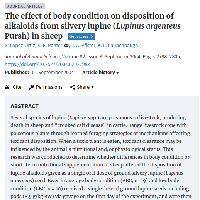Resumen
-
Several species of lupine (Lupinus spp.) are poisonous to livestock, producing death in sheep and “crooked calf disease” in cattle. Range livestock cope with poisonous plants through learned foraging strategies or mechanisms affecting toxicant disposition. When a toxic plant is eaten, toxicant clearance may be influenced by the animal's nutritional and/or physiological status. This research was conducted to determine whether differences in body condition or short-term nutritional supplementation of sheep altered the disposition of lupine alkaloids given as a single oral dose of ground silvery lupine (Lupinus argenteus) seed. Ewes in average body condition (ABC, n = 9) and low body condition (LBC, n = 10) received a single dose of ground lupine seeds including pods (8.5 g/kg BW) via gavage on the first day of the experiment, and were then randomly assigned to one of two nutritional supplement treatments. Blood samples were taken 0 to 60 h after dosing to compare blood alkaloid concentration and to evaluate alkaloid absorption and elimination profiles. Concentrations of total alkaloid and anagyrine, 5,6 dehydrolupanine, lupanine, and alkaloid E were measured in serum. These four alkaloids constituted 78 and 75% of the total alkaloid concentration in serum for LBC vs. ABC groups, respectively. Initial analysis indicated that short-term supplementation had no effect on alkaloid disposition, and supplementation was removed from the statistical model. The highest concentration of total alkaloids was observed 2 h after dosing. Overall, serum total alkaloid and anagyrine levels (area under the curve) were higher (P < 0.01) for sheep in the LBC group. Serum peak concentrations of total alkaloid and anagyrine were higher in LBC vs. ABC groups (P < 0.05). Serum elimination of anagyrine, unknown alkaloid E, and lupanine was decreased in LBC vs. ABC treatments (P < 0.05). These results demonstrate that body condition is important in the disposition of lupine alkaloids; however, further research is needed to determine the potential benefit, if any, that short-term nutritional supplementation might have on alkaloid disposition.
